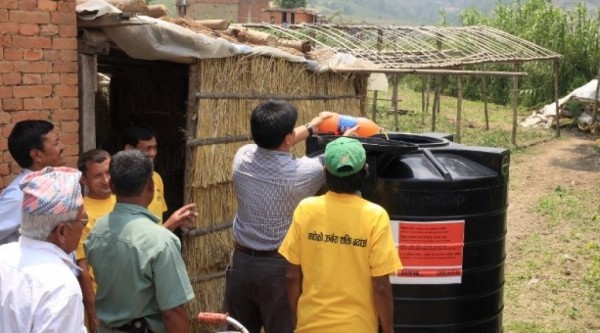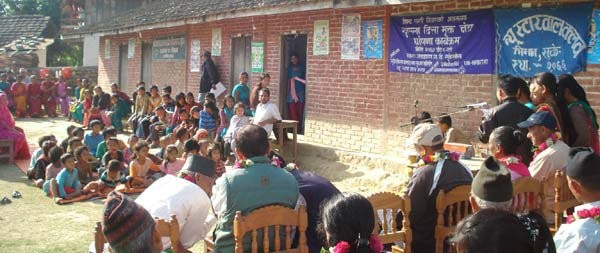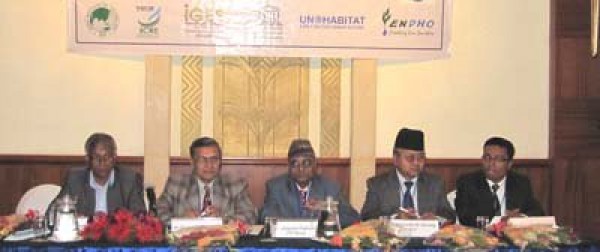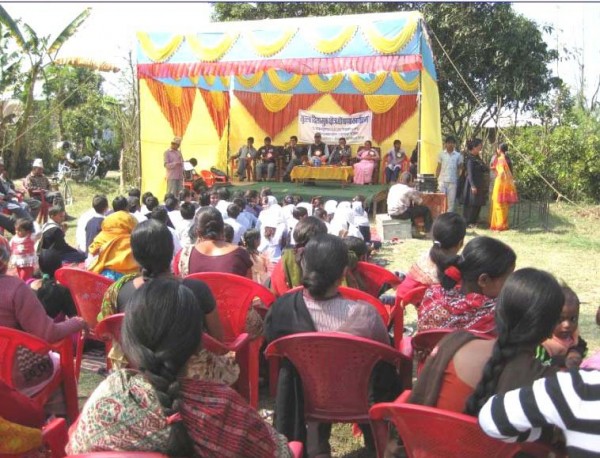Nepal: opening of Urine Bank in Siddhipur

On Monday 17th of May 2010 the “Urine Bank” in Siddhipur, Nepal was inaugurated. The urine bank, which is a spin-off from the STruvite recovery from Urine in Nepal (STUN), is a pilot project aimed at increasing the re-use of nutrients from human urine. Source-separated urine is collected from households which don’t have a use for it and is sold for 1 Nepalese Rupee per litre to farmers who use it to fertilise their crops.
In Siddhipur about 100 Ecosan toilets have been installed by various NGOs; most of these are of a type that allows for separation of urine from faecal matter. Therefore approximately 35000 litres of urine are available for use as plant fertiliser annually. Various studies found however that a large percentage of the source-separated urine was never used, but leached into the ground instead. For this there were various reasons, the most important of which is that a lot of people don’t have fields close to their house, so they cannot very easily use the urine. In a bid to increase the re-use of nutrients the STUN project was set up in a collaboration between UN-HABITAT and EAWAG from Switzerland (www.eawag.ch/stun). The aim of the project is to precipitate Struvite (a phosphorus fertiliser) from the urine and then either use the effluent in drip irrigation or treat it so that it can be leached without causing ground or surface water pollution.
 The project found that though the precipitation process is simple and robust it could not be operated profitably if the urine has to be collected from many households. The main reason is that the process needs a magnesium source for the precipitation to happen, but currently there is no market for magnesium in Nepal and thus the price of the magnesium is too high locally. Further experiments with Struvite precipitation will be done at a school in Kathmandu where large amounts of urine are available in one spot.
During the project an increasing number of farmers in Siddhipur have started using urine as a fertiliser, because it yields good growth results while the crops require noticeably less chemical pesticides. As a result there is enough demand in the village for the urine and all of it will be used as long as it can be bought from a central point. In order to facilitate this a central collection tank has been installed, and a user committee has been established. For the collection the user committee employs one person equipped with a bicycle, and this collector is paid 50% of the revenue from the sales of the fertiliser. The remaining half is used to set up a maintenance fund.
As a result of the work of number of enthusiastic pioneering farmers and the effort of various NGOs, Siddhipur now sets an example of how to increase farm productivity and combat environmental degradation through a new view on human “waste”.
Source: Sanitationupdate
The project found that though the precipitation process is simple and robust it could not be operated profitably if the urine has to be collected from many households. The main reason is that the process needs a magnesium source for the precipitation to happen, but currently there is no market for magnesium in Nepal and thus the price of the magnesium is too high locally. Further experiments with Struvite precipitation will be done at a school in Kathmandu where large amounts of urine are available in one spot.
During the project an increasing number of farmers in Siddhipur have started using urine as a fertiliser, because it yields good growth results while the crops require noticeably less chemical pesticides. As a result there is enough demand in the village for the urine and all of it will be used as long as it can be bought from a central point. In order to facilitate this a central collection tank has been installed, and a user committee has been established. For the collection the user committee employs one person equipped with a bicycle, and this collector is paid 50% of the revenue from the sales of the fertiliser. The remaining half is used to set up a maintenance fund.
As a result of the work of number of enthusiastic pioneering farmers and the effort of various NGOs, Siddhipur now sets an example of how to increase farm productivity and combat environmental degradation through a new view on human “waste”.
Source: Sanitationupdate









